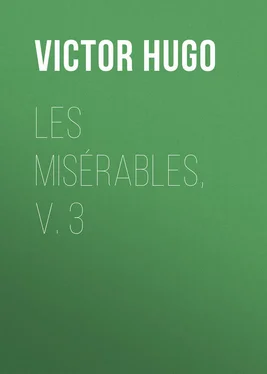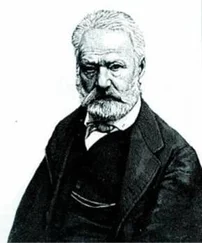Victor Hugo - Les Misérables, v. 3
Здесь есть возможность читать онлайн «Victor Hugo - Les Misérables, v. 3» — ознакомительный отрывок электронной книги совершенно бесплатно, а после прочтения отрывка купить полную версию. В некоторых случаях можно слушать аудио, скачать через торрент в формате fb2 и присутствует краткое содержание. Жанр: literature_19, foreign_antique, foreign_prose, на английском языке. Описание произведения, (предисловие) а так же отзывы посетителей доступны на портале библиотеки ЛибКат.
- Название:Les Misérables, v. 3
- Автор:
- Жанр:
- Год:неизвестен
- ISBN:нет данных
- Рейтинг книги:4 / 5. Голосов: 1
-
Избранное:Добавить в избранное
- Отзывы:
-
Ваша оценка:
- 80
- 1
- 2
- 3
- 4
- 5
Les Misérables, v. 3: краткое содержание, описание и аннотация
Предлагаем к чтению аннотацию, описание, краткое содержание или предисловие (зависит от того, что написал сам автор книги «Les Misérables, v. 3»). Если вы не нашли необходимую информацию о книге — напишите в комментариях, мы постараемся отыскать её.
Les Misérables, v. 3 — читать онлайн ознакомительный отрывок
Ниже представлен текст книги, разбитый по страницам. Система сохранения места последней прочитанной страницы, позволяет с удобством читать онлайн бесплатно книгу «Les Misérables, v. 3», без необходимости каждый раз заново искать на чём Вы остановились. Поставьте закладку, и сможете в любой момент перейти на страницу, на которой закончили чтение.
Интервал:
Закладка:
Victor Hugo
Les Misérables, v. 3/5: Marius
BOOK I
PARIS STUDIED IN ITS GAMIN
CHAPTER I
PARVULUS
Paris has a child and the forest has a bird; the bird is called a sparrow, the child is called a gamin. Couple these two ideas, the one which is all furnace, the other all dawn; bring the two sparks, Paris and childhood, into collision, and a little being is produced, – a homuncio , as Plautus would say.
This little being is joyous; he does not eat every day, and he goes to the theatre every night if he thinks proper. He has no shirt on his body, no shoes on his feet, and no covering on his head; he is like the flies, which have none of those things. He is from seven to thirteen years of age, lives in gangs, rambles about the streets, lodges in the open air, wears an old pair of his father's trousers, which descend lower than his heels, an old hat belonging to some other father, which comes below his ears, and one yellow list brace. He runs, watches, begs, kills time, colors pipes, swears like a fiend, haunts the wine-shop, knows thieves, is familiar with women of the town, talks slang, sings filthy songs, and has nothing bad in his heart; for he has in his soul a pearl, Innocence; and pearls are not dissolved by mud. So long as the man is a child, God desires that he should be innocent. If we were to ask the enormous city, "What is this creature?" it would reply, "It is my little one."
CHAPTER II
THE GAMIN'S CHARACTERISTICS
The gamin of Paris is the dwarf of the giantess. Let us not exaggerate: this cherub of the gutter has sometimes a shirt, but in that case has only one; he has shoes at times, but then they have no soles; he has at times a home, and likes it, for he finds his mother there; but he prefers the street, because he finds liberty there. He has games of his own, and his own tricks, of which hatred of the respectable class constitutes the basis, and he has metaphors of his own, – thus, to be dead, he calls eating dandelions by the root. He has trades of his own, – fetching hackney coaches, letting down steps, imposing tolls from one side of the street to the other in heavy showers, which he calls making ponts des arts , and shouting out speeches made by the authorities in favor of the French people. He has also a currency of his own, composed of all the little pieces of copper that can be picked up in the streets. This curious money, which takes the name of loques, has an unvarying and well-established value in this childish Bohemia.
Lastly, he has a fauna of his own, which he studiously observes in every hole and corner, – the Lady-bird, the death's-head moth, the daddy long-legs, and the "devil," a black insect which threatens by writhing its tail, and which is armed with two horns. He has his fabulous monster, which has scales on its belly and is not a lizard, and spots on its back but is not a frog; it lives in holes in old lime-kilns and dried-up wells; it is black, hairy, slimy, and crawls about, at one moment slowly, at another quickly; it utters no sound, but looks so terrible that no one has ever seen it. This monster he calls le sourde, and looking for it under stones is a pleasure of a formidable nature. Another pleasure is suddenly to raise a paving-stone and look at the woodlice. Every region of Paris is interesting for the celebrated "finds" which may be made in them; thus, there are earwigs in the timber-yards of the Ursulines, centipedes at the Panthéon, and tadpoles in the ditches of the Champs de Mars.
As for witticisms, this child is as full of them as Talleyrand; but though no less cynical, he is more honest. He is gifted with an unforeseen joviality, and startles the shop-keeper by his mad laugh. His range extends from genteel comedy to farce. A funeral passes, and among the persons following is a physician. "Hilloh!" shouts a gamin, "when did the doctors begin to carry home their own work?"
Another is in a crowd. A serious man, adorned with spectacles and watch-seals, turns indignantly: "You scoundrel, what do you mean by taking my wife's waist?" "I, sir? Search me!"
CHAPTER III
HE IS AGREEABLE
At night, thanks to a few half-pence which he always contrives to procure, the homuncio enters a theatre. On crossing this magical threshold he becomes transfigured; he was a gamin, and he becomes the titi . Theatres are like overturned vessels, which have their hold in the air, and the titis congregate in the hold. The titi is to the gamin as the butterfly to the chrysalis, – the same being, but now flying and hovering. It is sufficient for him to be present, with his radiant happiness, his power of enthusiasm and delight, and the clapping of his hands, which resembles the flapping of wings; and the narrow, fetid, obscure, dirty, unhealthy, hideous, abominable hold is at once called Paradise.
Give a being what is useless, and deprive him of what is necessary, and you will have the gamin. He possesses some literary intuition, and his tastes, – we confess it with all proper regret, – are not classical. He is by nature but little of an academician.
This being bawls, shouts, ridicules, and fights; wears patches like a babe, and rags like a philosopher; fishes in the gutter, sports in the sewers, extracts gayety from filth, grins and bites, whistles and sings, applauds and hisses, tempers the Hallelujah Chorus with Matanturlurette, hums every known tune, finds without looking, knows what he is ignorant of, is a Spartan in filching, is foolish even to wisdom, is lyrical even to dirt, would squat upon Olympus, wallows on the dungheap and emerges covered with stars. The gamin of Paris is the boy Rabelais.
He is not satisfied with his trousers if they have no watch-pockets.
He is surprised at little, and frightened by less; he sings down superstitions, reduces exaggerations, puts out his tongue at ghosts, depoetizes stilts, and introduces caricature into the most serious affairs. It is not that he is prosaic, far from it; but he substitutes a farcical phantasmagoria for solemn vision. If Adamastor were to appear to him, the gamin would say, "Hilloh, old Bogy!"
CHAPTER IV
HE MAY BE USEFUL
Paris begins with the badaud and ends with the gamin: two beings of which no other city is capable; the passive acceptance which is satisfied with looking, and the inexhaustible initiative; Prudhomme and Fouillou. Paris alone has that in its natural history: all the monarchy is in the badaud, all the anarchy is in the gamin. This pale child of the faubourgs of Paris lives, and is developed, and grows up in suffering, a thoughtful witness in the presence of social realities and human things. He believes himself reckless, but is not so: he looks on, ready to laugh, but also ready for something else. Whoever you may be who call yourself prejudice, abuses, ignominy, oppression, iniquity, despotism, injustice, fanaticism, or tyranny, take care of the yawning gamin.
This little fellow will grow. Of what clay is he made? Of anything. Take a handful of mud, a breath, and you have Adam. It is sufficient for a God to pass, and God has ever passed over the gamin. Fortune toils for this little being, though by the word fortune we mean to some extent chance. Will this pygmy, moulded in the coarse common clay, ignorant, uneducated, brutal, violent, and of the populace, be an Ionian or a Bœotian? Wait a while, dum currit rota , and the genius of Paris, that demon which creates children of accident and men of destiny, will behave exactly contrary to the Latin potter, and make an amphora out of the earthenware jar.
CHAPTER V
HIS CONFINES
The gamin loves the town, but he loves solitude as well, for there is something of the sage in him: he is urbis amator like Fuscus, and ruris amator like Flaccus. To wander about dreamily, that is, to lounge, is an excellent employment of time for the philosopher, particularly in that slightly bastard sort of country, ugly enough, but strange and composed of two natures, that surrounds certain large cities, and notably Paris. Observing the suburbs is looking at an amphibious scene; it is the end of the trees and the beginning of the roofs, the end of the grass and the beginning of the pavement, the end of the furrows and the beginning of the shops, the end of the beaten paths and the beginning of passions, the end of the divine murmur and the beginning of human reason, and all this produces an extraordinary interest; and such is the motive of the apparently objectless walks of the dreamer in those unattractive parts which the passer-by at once brands with the title of "dull."
Читать дальшеИнтервал:
Закладка:
Похожие книги на «Les Misérables, v. 3»
Представляем Вашему вниманию похожие книги на «Les Misérables, v. 3» списком для выбора. Мы отобрали схожую по названию и смыслу литературу в надежде предоставить читателям больше вариантов отыскать новые, интересные, ещё непрочитанные произведения.
Обсуждение, отзывы о книге «Les Misérables, v. 3» и просто собственные мнения читателей. Оставьте ваши комментарии, напишите, что Вы думаете о произведении, его смысле или главных героях. Укажите что конкретно понравилось, а что нет, и почему Вы так считаете.












